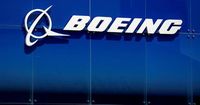Boeing is navigating turbulent times yet remains optimistic about its recovery prospects, according to Chief Financial Officer Brian West, who spoke at the Bank of America Global Industrials Conference on March 19, 2025. Despite the ongoing impact of tariffs imposed by former President Trump on aluminum and steel, West indicated that the company does not anticipate seeing a material impact from these measures in the short term.
West noted that nearly all of Boeing's aluminum is sourced domestically, making up only 1% to 2% of the average cost of an aircraft. "On the supply side, we don’t see material impact (from the tariffs)," he stated. He also highlighted that a majority of the parts used in Boeing's Commercial Aircraft (BCA) and Defense, Space, and Security (BDS) divisions come from U.S. suppliers—80% and 90%, respectively.
Furthermore, Boeing's extensive inventory buffer, acquired prior to the imposition of tariffs, is expected to shield the company from immediate problems. However, West voiced concerns about the broader supply chain and parts availability, saying, "We do worry about parts availability, due to the supply chain." This caution stems in part from a recent fire at SPS Technologies in Glenside, Pennsylvania, which has resulted in a significant 10% to 15% reduction in its production capacity—affecting their ability to produce airplane fasteners.
The incident, which led to hundreds of layoffs at SPS Technologies, is causing ripple effects throughout the industry as the company struggles to recover its workforce. Although Boeing seems well-placed to weather the current storm, suppliers may face considerable challenges without similar inventory reserves. As West remarked during his presentation, "We think we’ve got that pretty well managed," highlighting Boeing's proactive measures to sustain operations.
Despite the uncertainty, West reported a large backlog of aircraft deliveries, stating that Boeing will prioritize U.S. customers over international ones to lessen tariff impacts. The strategy involves adjusting delivery schedules based on customer needs, although, he admitted that this is a temporary fix that could become increasingly complex if the tariff situation drags on.
In a related concern, he also addressed the halting of KC-46 tanker deliveries due to cracks found in the wings of awaiting aircraft. Thankfully, West assured analysts that this issue would not significantly impact the overall delivery schedule for the year.
On the production front, Boeing aims to reach an output of 38 MAX jets per month and 7 Dreamliner jets per month by 2025. The company has been making strides to stabilize production amid previous quality issues, and West noted that many Key Performance Indicators (KPIs) are trending positively.
Looking ahead, West reiterated Boeing's attention to the certification of the new 777X program, which is now well into the second phase of flight-testing, having logged over 3,700 hours. As Boeing prepares to resume deliveries of the long-delayed 777-9 next year, West asserted, "Any new aircraft was a ways off," suggesting that while the company is focused on certification, new aircraft designs will need to wait.
Furthermore, the company faces significant financial adjustments, including an expected one-time $150 million charge against its first-quarter profits in 2025. However, West projected that Boeing's cash flow could improve by hundreds of millions in the upcoming quarter, marking a positive turn in financial performance.
West also touched on the divestment strategy of Boeing, explaining that while the company is in discussions to sell parts of the business, such as Jeppesen and Insitu, the focus remains on optimizing rather than transforming the core company structure. He indicated that a relatively small investment in Wisk Aero, which is developing autonomous air taxis, is producing valuable technological returns, and Boeing is keen to maintain that venture.
While the evaluation of both current and future prospects remains complex against the backdrop of political and industry pressures, West concluded his remarks by emphasizing a commitment to safety, quality, and stability as the cornerstones for Boeing’s recovery. He reiterated the company's goal of returning to historical financial results, much like the successful year of 2018, by increasing production rates across divisions.
As Boeing maneuvers through these multifaceted challenges, including potential global defense spending increases and evolving market demands, the company is endeavoring to adapt while preserving its stronghold in the aerospace sector. The enduring backlog of over 5,000 aircraft orders, principally composed of 737 models, offers a silver lining amid the turbulence, signaling robust demand for Boeing's products despite looming tariff concerns.





